Jews in Film: A Double Feature
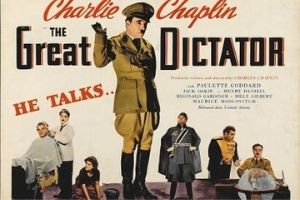
Blog post by Exhibitions Intern Alice Wynd. To read more posts by and about interns click HERE.
Ever since I started this internship, I have been learning more about Jewish life everyday. This rich culture, except for its portrayal in movies, was foreign to me just seven weeks ago. Now, as we come towards the end of the internship, and I am infinitely more knowledgeable, I had the idea to revisit a couple of the films I have watched that feature Jewishness: Charlie Chaplin’s The Great Dictator and The Comedian Harmonists, to look at what they have to say about the Jewish experience with new perspective. I also have a more selfish motivation…to share these great movies with more people! These extraordinarily different films, unsurprisingly, tackle the subject in contrasting ways. Note: spoilers for both films will follow!
The Great Dictator (1940)
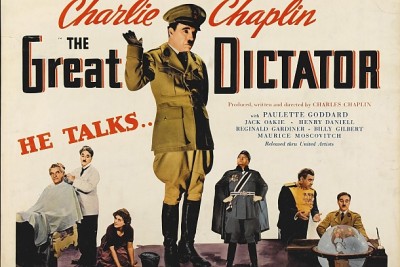
Charlie Chaplin’s first sound film, The Great Dictator, satirizes Adolf Hitler, fascism, and anti-semitism. One of this film’s many strengths is its incredible timeliness. It was released in 1940, a year before the attacks on Pearl Harbor and the United States’ entry into WWII. Chaplin’s character makes a speech to the audience at the end of the film , imploring the people of the world to exercise their humanity. The fact that, at the time he delivered that speech, the Holocaust was just beginning makes his message even more profound.
The Great Dictator, is not, however an overly heavy film. It actually has a great deal in common with Chaplin’s earlier movies: cases of mistaken identity, physical comedy, and hilariously over-the-top characters. In one of my favorite sequences in the film, Chaplin’s farcical Hitler character plays with a giant globe balloon–representing his naive desire to conquer the world–only to have it explode in his hands. Charlie Chaplin weaves together comedy and political commentary so deftly that the lines between them are blurred.
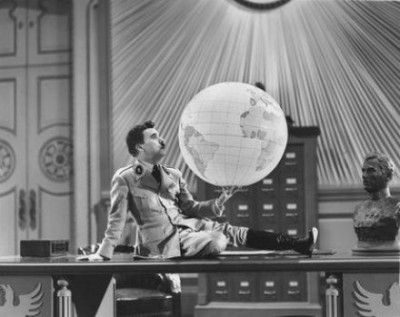
The most symbolically meaningful feature of this film is the fact that Chaplin’s version of Hitler and the Jewish protagonist change places through the course of the film. The protagonist, known only as “the barber”, takes advantage of his resemblance to “Adenoid Hynkel” in order to bring down his regime with appeals to kindness. Charlie Chaplin made a point of creating a deep, human Jewish hero while Jews were being dehumanized just across the Atlantic. If I were to summarize the main point of The Great Dictator, it would be that Jews are human and deserve dignity; a simple but powerful message.
The Comedian Harmonists (1997)
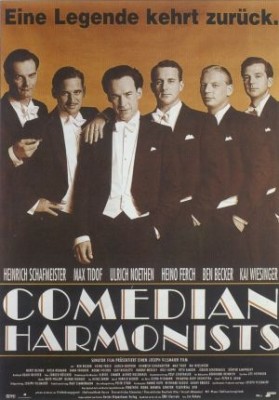
I originally watched this film for a German class when we were studying the culture of the Weimar Republic. It follows the German music group, The Comedian Harmonists, through their rise in popularity, which ran parallel in time to the rise of the Third Reich. Three of the six group members–Harry Frommermann, Ari Leschnikoff, and Roman Cycowski–were Jewish. Harry, the protagonist, is also in a relationship with a non-Jewish German woman named Erna, and the film shows the danger that the Nazi regime posed to the couple. The most interesting aspect of this movie, to me, is the disbelief the characters express at each stage when the Third Reich gained power. When a group of Nazi soldiers vandalized the music store where Erna worked and attacked Harry, the store owners remarked that they couldn’t believe that could happen in Germany. Knowing the horrors that would unfold later, it was interesting to see the characters’ perspectives from the beginning.
What does The Comedian Harmonists have to say about being Jewish? It certainly demonstrates the danger of being a famous Jew in Germany during the beginning of the Third Reich and the painful choices they had to make in order to keep themselves and their loved ones safe.
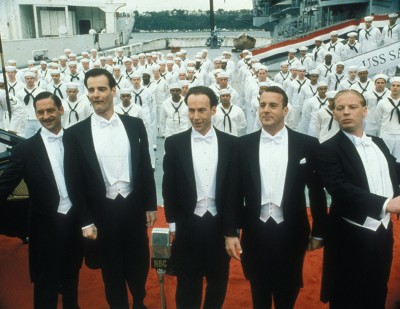
I would recommend these two movies to anyone, regardless of their background. The Great Dictator makes sweeping, acute statements about the nature of humanity, while The Comedian Harmonists is more concerned with the daily dangers and conflicts of Jews living in Germany at the beginning of the Third Reich. As a lifelong fan of movies, I am thankful that the work that I have done in this internship has provided me with the experience to consider some of my favorite films in a new light! This is one of the many benefits of working at the Jewish Museum of Maryland!
